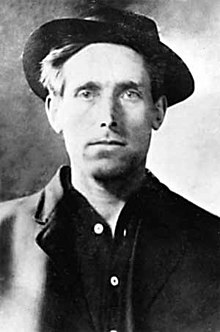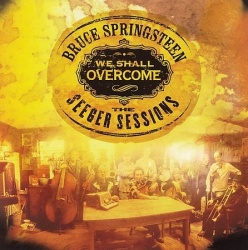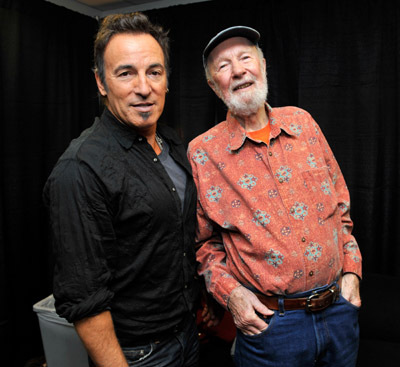Bruce on the artist
2020-09-02 SiriusXM Studio, New York City
Bruce Springsteen: From My Home, To Yours… Part 11' brings honor to Labor Day.
Bruce: "Now born in 1879, Joe Hill was a Swedish-American labor activist and a member of the Industrial Workers of the World, better known as The Wobblies. He was dubiously convicted of a murder, and executed by firing squad on Nov. 19, 1915, at Utah's Sugar House Prison. This was his Last Will and Testament:"
"My will is easy to decide, for there is nothing to divide.
My kin don't need to fuss and moan, moss does not cling to a rolling stone.
My body? Oh! If I could choose I would want to ashes it reduce.
And let the merry breezes blow my dust to where some flowers grow.
Perhaps some fading flower then would come to life and bloom again.
This is my last and final will.
Good luck to all of you."
Joe Hill
was a Swedish-American labor activist and songwriter. Joe Hill was a native Swedish speaker, he learned English during the early 1900s, while working various jobs from New York to San Francisco. Hill, an immigrant worker frequently facing unemployment and underemployment, became a popular songwriter and cartoonist for the union. His most famous songs include "
The Preacher and the Slave", "
The Tramp" , "
There is Power in a Union" ,"
The Rebel Girl".
In 1914, John G. Morrison, a Salt Lake City area grocer and former policeman, and his son were shot and killed by two men. The same evening, Hill arrived at a doctor's office with a gunshot wound, and briefly mentioned a fight over a woman. Yet Hill refused to explain further, even after he was accused of the grocery store murders on the basis of his injury. Hill was convicted of the murders in a controversial trial. Following an unsuccessful appeal, political debates, and international calls for clemency from high-profile figures and workers' organizations, Hill was executed in November 1915. After his death, he was memorialized by several folk songs. His life and death have inspired books and poetry.

In 2006, Bruce released the album '
We Shall Overcome: The Seeger Sessions' . The album contains Springsteen's interpretation of thirteen folk music songs associated with
Pete Seeger. The project began in late 1997 when Springsteen agreed to contribute a recording for an upcoming Pete Seeger tribute album on Appleseed Recordings. "Growing up a rock n' roll kid I didn't know a lot about Pete's music or the depth of his influence," Springsteen later wrote in the liner notes of his 2006 album. He headed to the record store, came back with an armful of Pete Seeger records, and proceeded to investigate and listen to his music.


"As Pete and I traveled to Washington for President Obama's Inaugural Celebration, he told me the entire story of "We Shall Overcome". How it moved from a labor movement song and with Pete's inspiration had been adapted by the civil rights movement. That day as we sang "This Land Is Your Land" I looked at Pete, the first black president of the United States was seated to his right, and I thought of the incredible journey that Pete had taken. My own growing up in the sixties in towns scarred by race rioting made that moment nearly unbelievable and Pete had thirty extra years of struggle and real activism on his belt. He was ao happy that day, it was like, Pete, you outlasted the bastards, man!...It was so nice. At rehearsals the day before, it was freezing, like fifteen degrees and Pete was there; he had his flannel shirt on. I said, man, you better wear something besides that flannel shirt! He says, yeah, I got my longjohns on under this thing. And I asked him how he wanted to approach "This Land Is Your Land". It would be near the end of the show and all he said was, "Well, I know I want to sing all the verses, I want to sing all the ones that Woody wrote, especially the two that get left out, about private property and the relief office." I thought, of course, that's what Pete's done his whole life. He sings all the verses all the time, especially the ones that we'd like to leave out of our history as a people. At some point Pete Seeger decided he'd be a walking, singing reminder of all of America's history. He'd be a living archive of America's music and conscience, a testament of the power of song and culture to nudge history along, to push American events towards more humane and justified ends. He would have the audacity and the courage to sing in the voice of the people, and despite Pete's somewhat benign, grandfatherly appearance, he is a creature of a stubborn, defiant, and nasty optimism. Inside him he carries a steely toughness that belies that grandfatherly facade and it won't let him take a step back from the things he believes in. At 90, he remains a stealth dagger through the heart of our country's illusions about itself. Pete Seeger still sings all the verses all the time, and he reminds us of our immense failures as well as shining a light toward our better angels and the horizon where the country we've imagined and hold dear we hope awaits us. Now on top of it, he never wears it on his sleeve. He has become comfortable and casual in this immense role. He's funny and very eccentric. I'm gonna bring Tommy out, and the song Tommy Morello and I are about to sing I wrote in the mid-nineties and it started as a conversation I was having with myself. It was an attempt to regain my own moorings. Its last verse is the beautiful speech that Tom Joad whispers to his mother at the end of The Grapes of Wrath."
'Wherever there's a cop beatin' a guy
Wherever a hungry newborn baby cries
Where there's a fight 'gainst the blood and hatred in the air
Look for me Mom I'll be there'
"Well, Pete has always been there. For me that speech is always aspirational. For Pete, it's simply been a way of life. The singer in my song is in search of the ghost of Tom Joad. The spirit who has the guts and toughness to carry forth, to fight for and live their ideals. I'm happy to report that spirit, the very ghost of Tom Joad is with us in the flesh tonight. He'll be on this stage momentarily, he's gonna look an awful lot like your granddad who wears flannel shirts and funny hats. He's gonna look like your granddad if your granddad could kick your ass. ..
This is for Pete... "